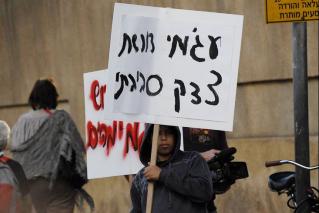ILA Must Use Public Land to Benefit the Public, Not Just to Make Profit

New petition seeks to alter the considerations according to which public land is allocated so that it benefits the public at large rather than just the state coffers.
On Wednesday 10th July 2013 residents of the Ajami neighborhood in
The petitioners claim that the ILA’s decision to allocate one of the few remaining plots of state land in Ajami to the highest bidder is highly unreasonable given the severe housing shortage in the neighborhood. Having contributed to this crisis through years of neglect and stagnant planning policy, the state now views gentrification as a desirable alternative to the status quo and is promoting construction suited only to high-income gentrifying elements.
The petitioners further claim that in allocating state lands, ILA is obligated by law to weigh several diverse considerations including the possibility of allocation for public and affordable housing. Financial considerations are just one consideration, and certainly not primary one. The authority is obligated, among other things, to examine the needs of the local population and provide immediate responses to housing shortages in the area – an obligation that in this case has not been met. The authority must also act according to principles of distributive justice, which means that the development of a given area will not occur for the benefit of, rather than at the expense of, residents who have lived there for decades.
Residents report that the current plans for development in the area have led to a dramatic rise in housing prices that pushes out veteran residents unable to afford the new high prices. Moreover, although gentrification has negative effects on both Jewish and Arab residents of the neighborhood, the impact on the Arab community is especially severe given the fact that the neighborhood constitutes a cultural, religious and community center for which there is no substitute in the area.
The petition is based in part on a report prepared by Bimkom and the Technion Planning Community Laboratory that surveyed the housing shortfall in the Palestinian population of
According to Nawal Khoury, Coordinator at Darna, “the administration’s policy, which prefers the interests of future residents of
Attorney Hisham Shabita of the Human Rights Clinic at
Attorney Gil Gan Mor, Director of the Right to Housing Program at ACRI: “It’s a matter of distributive justice. Development at the expense of the veteran population, that pushes it into another impoverished neighborhood, without allowing it to enjoy the fruits of the development, is injustice that cries out to the heavens. Were the public at large to benefit from the development, even if it were to come at the expense of cheap housing in the area, then there may be a justification for public resources being allocated in that manner, so long as the development is not all done entirely on the backs of the veteran residents.”
Attorney Jalal Dakwar of Adalah: over the years the residents of the neighborhood were given explicit commitments regarding housing solutions, which were also anchored in court decisions, but the state has violated these obligations over and over again without considering the acute housing crisis faced by the neighborhood residents, most of whom are Arabs .
The petition was filed with a request for a temporary conditional order halting the allocation of the land until a court decision is reached.
Related Materials:
To read the petition (in Hebrew), click here.
To read about ACRI’s intervention in 2009 to prevent the ILA from granting tenders in the Ajami neighborhood to a very select group of buyers, click here.

















